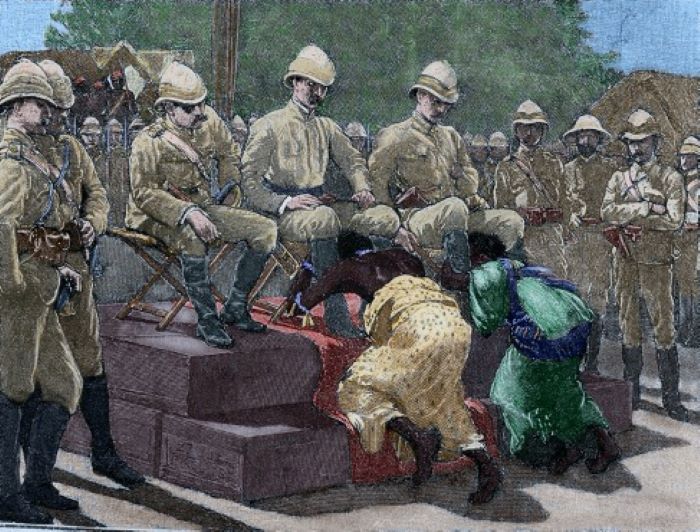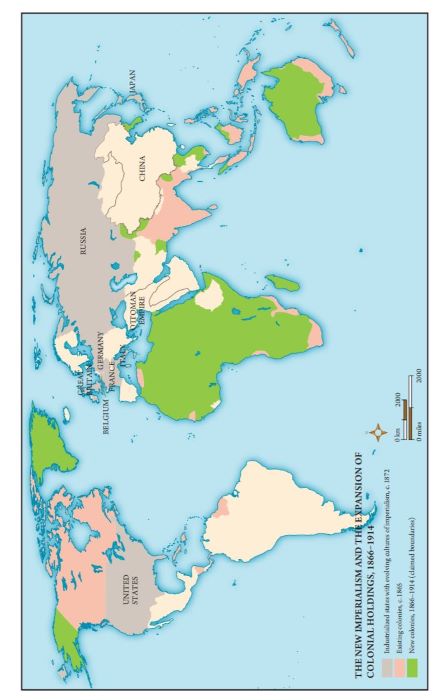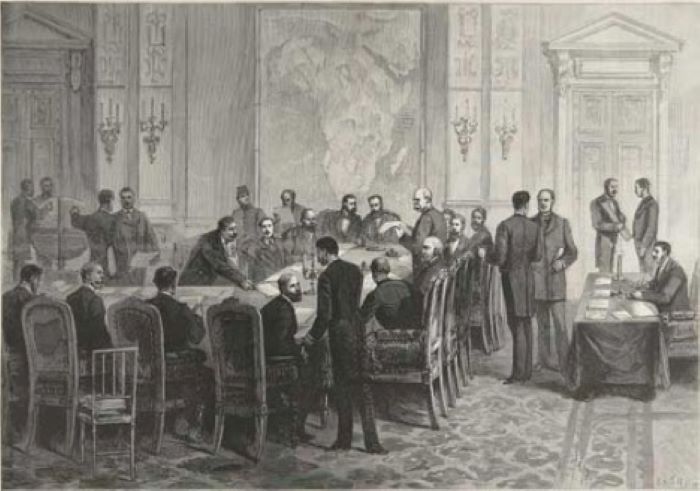New Imperialism
- Due Feb 1, 2021 at 11:59pm
- Points 20
- Questions 4
- Available Jan 25, 2021 at 8am - Feb 1, 2021 at 11:59pm
- Time Limit None
Instructions
WATCH the video:
Industrialization and imperialism | World History | Khan Academy
TEXT READER https://www.naturalreaders.com/online/
READ: Industrial Imperialism, the “New” Imperialism
By Trevor Getz
Imperialism was only truly new 4,500 years ago (shout out to the Akkadians). But it got a surprising revival when some parts of the world industrialized. Several factors led to this "new" imperialism.
The world in 1880 was made of both nation-states and empires. As you have already learned, once the idea of sovereignty seemed achievable, it went viral. People around the world were increasingly driven by a nationalistic feeling to have their own countries (nation-states). This meant that some empires were slowly breaking up. At the same time, many great imperial powers still held on to colonies, as in South Asia and the Caribbean. Nearly all the industrialized states had hit the pause button on empire expansion by this time, happy to stick with what they already had. But in 1880, that changed faster than you could say "production and distribution."
Suddenly, vast regions of the world were colonized by empires that were, once again, growing. For instance, in 1880, the enormous continent of Africa was still mostly made up of independent states and societies. By 1914, Ethiopia and Liberia were the only two independent states left. The rest of the continent was colonized, divided between Britain, France, Germany, Portugal, Italy, Belgium, and Spain. Meanwhile, mainland southeast Asia was conquered, mostly by France. Many Pacific Islands were occupied by the United States, Japan, Germany, France, and Britain. Korea was subjugated (conquered) by Japan. This rapid expansion of colonization around 1880 is often called "New Imperialism". What happened in the last decades of the nineteenth century to cause this rapid change?
Was the “new imperialism” actually new?
The first question we must ask about the "New Imperialism" is this: what was new about it?
Now, to begin to answer that question, we have to define some rather messy terms. The first is imperialism and the second is colonialism. These two terms are sometimes used interchangeably, but they are actually different. Both occur in empire, which is a third term we have to define (although we have actually defined it before!).
Empires are states made up of many communities, where one community has control over, and more rights than, the others. Imperialism is a term used to describe the ideas, beliefs, and actions that one group uses to justify and hold control over the others. Colonialism is the experience of the other groups who are being ruled. But again, these last two terms are, in practice, sometimes used interchangeably.
Now, empires go back thousands of years in world history! They divided people into a community of citizens with rights, and communities of subjects, with few or none. They also divided their territory into multiple states and regions. These empires had one ruler or ruling body controlling these different people and regions. They did it then, and they did it again in the late nineteenth century, so we're still not seeing the "new" part.
In fact, when we look closely at the empires of the "New Imperialism", we see that they were partly modeled on earlier empires. For example, Britain ran their new colonies in Africa in much the same way as they'd been running their massive colony in India for a century. Even more astoundingly, Britain's policies and procedures for managing India (a region far larger than Britain itself) were partly based on strategies the Mughal Empire had used to control India over a hundred years earlier. For example, the British model of "indirect rule" in their new African colonies—finding local allies and paying them to do most of the governing—was based on similar practices they had learned from the Mughals in South Asia.
Some British methods of ruling the new colonies were influenced by even older policies they had created to rule their North American and Caribbean colonies in the sixteenth and seventeenth centuries!
Nevertheless, many factors led to this unprecedented version of empire expansion after the 1880s. There were technologies, ideas, and beliefs that gave Europeans, and the inhabitants of a few other countries, a motive and justification for constructing empires. Many of these were new, and certainly their combination was new, and so we call this a "New Imperialism".
Why did the new imperialism happen?
In 1865, a British parliamentary committee recommended that Britain pull back from some of its colonies, rather than expanding. By the 1880s, however, this stance had been reversed. Britain was rapidly trying to build a bigger empire, alongside other industrial powers. Why were they—and many other industrialized nations—suddenly so eager for more colonies?
In seeking to understand the emergence of this New Imperialism, historians look at many factors, not just one. It's not that historians are indecisive or love writing long essays. It's just that, as with so many topics throughout history, there are numerous causes. They play off each other in important ways. The changing elements include technology, industrialization and capitalism, racism, nationalism, and… something else.
-
Technology: Before the late nineteenth century, European states (and Japan) couldn't conquer much of the tropical world. They were held back by disease, sure. But also there were large, organized societies in many of these regions that were pretty well armed with low-tech, but effective weapons. Even if invaders had been able to take vast areas, slow communications systems would have made ruling them too difficult. All that changed when several new technologies appeared. New medicines made it possible for Europeans and white Americans to survive malaria and other tropical diseases. The machine gun and other new weapons gave conquerors a big military advantage. Telegraphs, trains, and steamships reinvented communications and travel, making it much easier to rule bigger empires.
-
Industrialization and capitalism: This high-tech wave had been born mostly out of industrialization, giving Europe, the United States, and Japan these big advantages. But before you give credit to industrialization for solving problems, it's a good idea to look at the problems it created. The growth of factories in industrialized countries meant that their businesses had an increasing demand for raw materials. Korea, the African continent, and Southeast Asia had almost no factories, but plenty of raw materials. Since imperialists were also capitalists for the most part, they needed customers for all this great new stuff they were making. They went for a kind of two-for-one deal by conquering territories that could provide the raw materials they needed, and a population who would then buy their finished products.
-
Racism: Existing misconceptions about race, many of which emerged with the Atlantic slave trade, were becoming even more solidified in this era. Many people within these big imperial powers believed it was their right to rule over people they thought were inferior. Within their own societies, there was already some level of racial segregation. For example, in the United States at this time, post-slavery Jim Crow laws tried to reduce the freedoms and rights of African Americans. When applying these superior/inferior racist ideas to ruling people overseas, some even justified their invasions as if they were doing a favor. They viewed empire expansion as a "civilizing mission" to improve the lives of the "uncivilized" and "inferior" people they conquered.
-
Nationalism: You may remember that nationalism began with the idea that all people (the "nation") should have the right to rule themselves through their own government (the "state"). But nationalism could be twisted to the idea that one's own nation was superior to other nations, and had a right to rule over them (see "racism", above). It could also create a competitive attitude among nations. In this era, in particular, nationalism pushed the governments of Britain, France, Germany, and other European powers to compete, first in Europe and then around the world. Nationalism motivated imperialists to take new colonies before their competitors could.
-
“Men-on-the-spot”: This term was created when writers paid less attention to women in history, but in hindsight it may not be an achievement you'd want on your résumé anyway. Everything we have mentioned so far was the result of big trends in the organization of societies. But sometimes, power shifted because of one person or a few people. In some cases, new colonies were carved out because a general or a businessman who had employees with guns just went out and grabbed some new territory, often because they were greedy or wanted glory, and there was no one there to stop them. This happened more often than you might think!
Each of these factors played a role in the New Imperialism. The big, global trend that had industrial powers rushing to claim new colonies depended on the interaction of these factors each time a new colony was created. For example, a typical "man-on-the-spot" likely used new weapons (technology) to conquer people he thought were inferior (racism) to expand his business (industrialism/capitalism) and be politically rewarded back home for making his country proud (nationalism).
The situation in those colonies was also influenced by local factors. How much were locals organized to resist colonialism? How did they react? What was the environment like? What did the people choose to do? As we will see soon, these issues also played a role in the New Imperialism.
Next: Completely answer all questions.
Only registered, enrolled users can take graded quizzes


